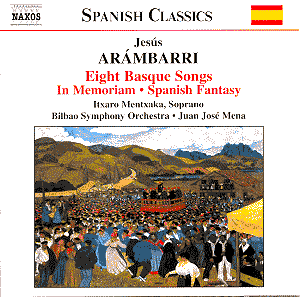Arámbarri is
best known as a conductor but this disc
of his own compositions is an absolute
peach. Following on from the Naxos
Guridi disc, this confirms what
a great and rich musical heritage the
peoples of the Basque lands, straddling
France and Spain, have to bring to us.
Much of the music here reminds me more
of the former than the latter, with
the lighter Milhaud a particularly significant
comparator for the folk-based suites.
This whole disc is absolutely compulsive
as far as this listener is concerned,
a superbly chosen cross-section of the
composer's output. The elegiac tributes
to Falla (Offrenda) and de Gortázar
(In Memoriam) are truly heartfelt
and, in the latter, the quote from one
of Guridi's best pieces (Asi canatan
los chicos) is both highly touching
and very appropriate.
The opening Preludio
is a wonderfully infectious piece, rooted
in the composer's native folk music
(itself displaying a close kinship with
Breton and other Celtic musics), and
very similar, in spirit, to Milhaud's
musical tribute to his own folk memory
(that of Provence). It's galloping finale
exhibits a real joie de vie,
somewhat at odds with the subtitle Witches
on New Year's Eve! The following
Four Impromptus are in much the
same vein and in the slower central
pieces, particularly the first, the
modal character of the music brings
it very close to the "English pastoral
tradition", whatever positive or negative
feelings that phrase might bring to
mind. The excellent booklet notes quite
rightly refer to Arámbarri's
"elegance and restrained Romanticism"
and nowhere is this more the case than
in the Eight Basque Songs. If
you can imagine a more ambivalent, sparer
Chants d'Auvergne then you are
not far wide of the mark, and Itxaro
Mentxaka sings them beautifully and
with an obvious love of the material.
As mentioned above, the two elegies
can stand comparison with the best of
that genre, with In Memoriam
especially innovative, particularly
in its use of underpinning percussion.
The discs penultimate piece is the interlude/intermezzo
from Arambarri's zarzuela Viento
Sur (South Wind) which again exhibits
a masterful orchestrative touch and
a which belies the operetta associations
of the genre from which it is drawn.
In fact, the short plot synopsis, as
stated here, sounds more like Riders
to the Sea than the Pirates of
Penzance! The concluding Spanish
Fantasy finds the composer, not
surprisingly, at his most Spanish and
yet, even here, it isn't full blown,
resembling Rodrigo's lighter, neo-classical
moments rather than, say, Turina or
Granados. It is perhaps more instructive
to compare it with something like Ravel's
Spanish pieces (e.g. Alborada del
Gracioso), with the familial Basque
link of the latter composer making it
particularly appropriate.
So, this is a brilliant
introduction to a very worthwhile and
accessible voice, but one that is clearly,
from listening to the music, Basque
first and Spanish second, yet none the
worse for that. I can only exhort you
to follow this disc up buy investigating
further the Basque musical heritage
- there is not only the Naxos Guridi
but a whole series on the Swiss based
Claves label (many of these have previously
been reviewed on Musicweb) and even
a Toulouse/Plasson disc on EMI. The
latter may want you to investigate further
the choral side of the tradition, in
which case Oldarra on Erato/Detour
is an exemplary collection. Highly recommended.
Neil Horner
see also review
by Hubert Culot
